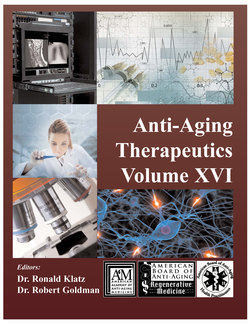Читать книгу Anti-Aging Therapeutics Volume XVI - A4M American Academy - Страница 33
На сайте Литреса книга снята с продажи.
INTRODUCTION
ОглавлениеThe menopause is centered on the ovary and its in-built obsolescence. The events of the menopause start when the active ovary begins to fail and ends when the ovary lapses into inactivity. The duration of these events is variable. Stimulated by the pituitary, one follicle develops each month as a hormone-producing organ, with a lifespan of 28-days. Follicles continue to develop until they cease responding to stimuli from the pituitary. The 32-week fetus has approximately 7 million primordial follicles. At birth, the number drops to 2 million and by puberty only 300,000 to 300,800 remain. In adulthood, about 400 follicles will be responsible for the production of the ova and hormones. It is important to realize that during menopause women lose not only ovarian but also the brain’s response to hormonal triggers. For example, in menopause, the brain no longer responds to estrogen and /or luteinizing hormone (LH).
Menopausal women become deficient in multiple hormones such as estrogen, progesterone, testosterone, and DHEA1-6 with increases in LH, follicle stimulating hormone (FSH) and thyroid stimulating hormone (TSH).7-10 All of these hormones have individual as well as inter-related functions in the human body, including pulmonary, cardiovascular, GI and immunological functions. As increased life expectancy has changed the aging pyramid, clinical attention increasingly focuses on an identified decline in cognitive function due to the normal aging process.6,11 In fact, estrogen deficiency has been proposed as a cause of memory deficits in postmenopausal women.12 There are studies which suggest that LH increases after menopause with concomitant decline in cognitive performance.13 Chorionic gonadotropin receptors and LH occur in the brain.14 Thus, levels of LH and FSH may increase low-density lipoprotein receptor–related protein in the brain.12,15 Levels of FSH increase dramatically in women during and after menopause and can be lowered with estrogen therapy.12,16 Emerging evidence suggests that high TSH levels are associated with a 2-fold risk of cognitive decline as well as prevalence of anomalies in musculoskeletal systems.17-19
We hypothesized that females presenting with complaints related to menopause would have a number of associated hormonal changes relating specifically to both somatic and neurological symptoms. We used various statistical methods to examine the relationship of hormone levels and symptom complexes, including Pearson Product-Moment correlations, factor analysis, and ANOVA.
